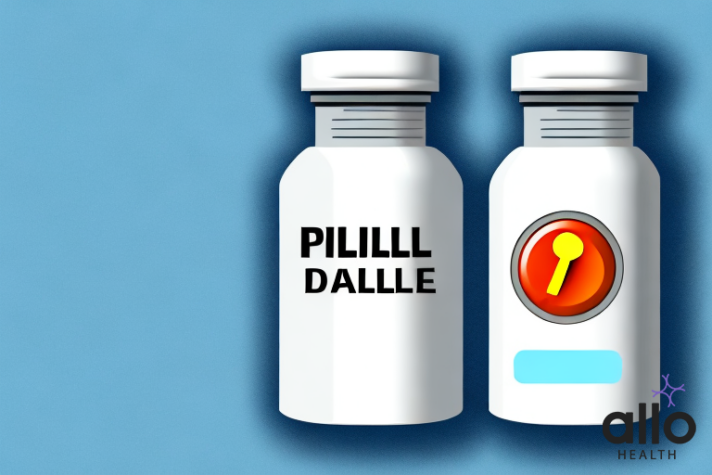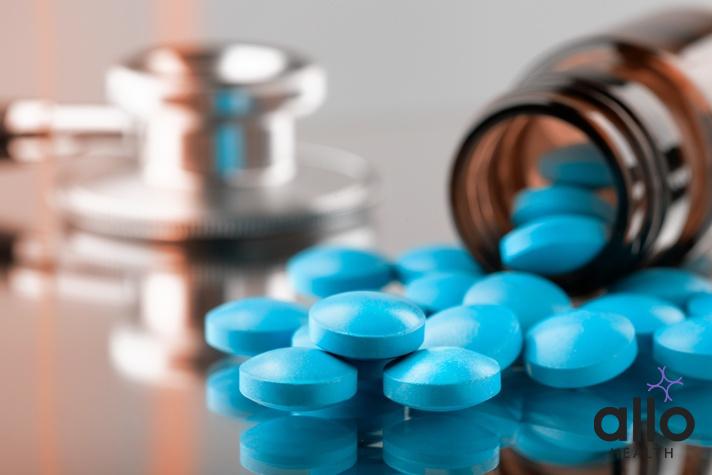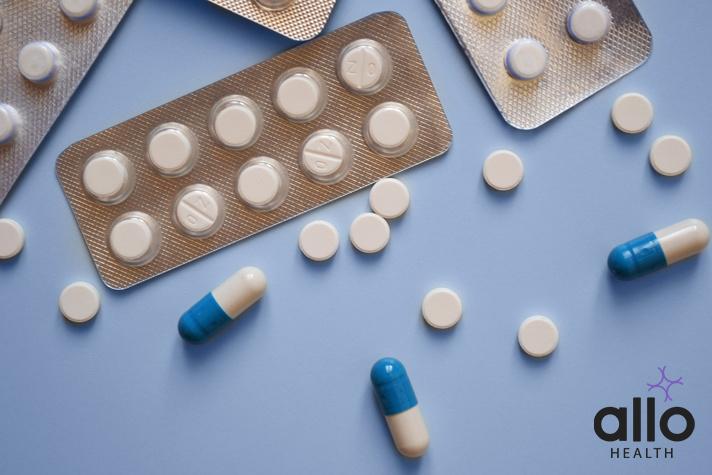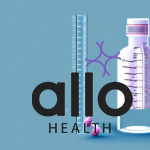What To Know About a Tadalafil Overdose

Allo Health is dedicated to personalized well-being, offering support and trusted information tailored to individual health goals. The platform emphasizes human-generated content, led by a distinguished medical team of experts, including physicians and sexual health specialists. Their commitment to credibility involves rigorous fact-checking, authoritative research, and continuous updates to ensure accurate, up-to-date information. Allo Health's unique approach goes beyond conventional platforms, providing expert-led insights and a continuous commitment to excellence, with user feedback playing a crucial role in shaping the platform's authoritative voice.

Dr Sanina Mansoor holds MBBS degree from Yenepoya university,Mangalore.She has 8 years of experience working as a medical officer at various health centres and medical colleges.
Why This Was Upated?
Our experts continually monitor the health and wellness space, and we update our articles when new information became available.
Updated on 16 February, 2024
- Article was updated as part of our commitment to diversity, equity, and inclusion.

"The following blog article provides information about a drug or brand name drug and its potential effects or benefits. However, it is crucial to understand that this information is intended for general educational purposes only and should not be considered a substitute for professional medical consultation. It is highly recommended to consult with a qualified healthcare professional before making any decisions regarding medication, treatment, or healthcare management.
Book consultation
Individuals have unique medical conditions, and the information provided in this article may not be applicable to everyone. Only a qualified healthcare provider can evaluate your specific medical situation, taking into account your medical history, conducting appropriate tests, and providing personalized advice and recommendations. They are equipped to make informed decisions tailored to your individual needs.
It is crucial to emphasize that self-diagnosis, self-medication, or disregarding medical advice can have serious health consequences. This article may reference specific brand names or drugs for illustrative purposes. Mention of these names does not imply endorsement, recommendation, or guarantee of their efficacy or safety. The choice of medication should be based on discussions and individualized guidance from a healthcare professional who has a comprehensive understanding of your medical condition.
"Tadalafil is a medication used to treat erectile dysfunction and pulmonary arterial hypertension. While the drug is generally safe when taken as prescribed, taking too much of it can lead to serious consequences. In this article, we will take a closer look at what you need to know about a tadalafil overdose.
What Is Tadalafil?
Tadalafil is a medication primarily used to treat erectile dysfunction (ED) in men. It belongs to a class of drugs known as phosphodiesterase type 5 (PDE5) inhibitors. This medication works by increasing blood flow to the penis during sexual stimulation, helping men achieve and maintain an erection.
Here are some key points about Tadalafil:
- Mechanism of Action: Tadalafil inhibits the enzyme phosphodiesterase type 5, which normally breaks down cyclic guanosine monophosphate (cGMP) in the smooth muscle cells of the penis. By inhibiting this enzyme, Tadalafil increases the levels of cGMP, leading to relaxation of the smooth muscles and increased blood flow to the penis, facilitating an erection.
- Indications: Tadalafil is primarily prescribed for the treatment of erectile dysfunction (ED), but it also has other medical uses. In some cases, it is prescribed to treat symptoms of benign prostatic hyperplasia (BPH), a condition where the prostate gland becomes enlarged and causes urinary concerns.
- Brands: Tadalafil is available under various brand names, with one of the most well-known being Cialis. There are also generic versions of Tadalafil available.
- Dosage Forms: Tadalafil is commonly available in oral tablet form, with different strengths ranging from 2.5 mg to 20 mg. The recommended dose depends on the individual’s health, the severity of the condition, and other factors. It is usually taken as needed before sexual activity.
- Duration of Action: Tadalafil has a longer duration of action compared to some other PDE5 inhibitors, with effects lasting up to 36 hours. This has led to its nickname as the “weekend pill.”
- Precautions and Side Effects: Like any medication, Tadalafil may cause side effects, including headaches, indigestion, back pain, muscle aches, and flushing. It is important to inform your healthcare provider about any pre-existing medical conditions or medications you may be taking, as certain conditions and drug interactions could impact the safety and efficacy of Tadalafil.
- Contraindications: Tadalafil should not be used in combination with nitrates, as it can lead to a sudden and significant drop in blood pressure. It is also contraindicated in individuals with severe liver or kidney concerns.
- Consultation with Healthcare Provider: Before using Tadalafil, it is crucial to consult with a healthcare professional who can assess your health status and determine if this medication is suitable for you.
Remember that Tadalafil is a prescription medication, and it should only be taken under the guidance of a qualified healthcare professional. Always follow the prescribed dosage and instructions for use. If you experience any adverse effects or have concerns about the medication, consult your healthcare provider promptly.

Tadalafil Benefits And Uses
Tadalafil is primarily used to treat erectile dysfunction (ED), but it also has additional benefits and uses. Here are some details about its benefits and various applications:
- Treatment of Erectile Dysfunction (ED):
- Mechanism of Action: Tadalafil belongs to the class of phosphodiesterase type 5 (PDE5) inhibitors. It works by inhibiting the PDE5 enzyme, leading to increased levels of cyclic guanosine monophosphate (cGMP). This, in turn, promotes smooth muscle relaxation in the penis and enhances blood flow, helping men achieve and maintain an erection during sexual stimulation.
- Effectiveness: Tadalafil is known for its prolonged duration of action, with effects lasting up to 36 hours. This provides a longer window of opportunity for sexual activity compared to some other ED medications.
- Treatment of Benign Prostatic Hyperplasia (BPH):
- Symptom Relief: Tadalafil is sometimes prescribed to alleviate symptoms associated with benign prostatic hyperplasia (BPH), a non-cancerous enlargement of the prostate gland. It helps relax the smooth muscles in the bladder and prostate, improving urinary flow and reducing symptoms like difficulty urinating, frequent urination, and urgency.
- Combination Therapy: In some cases, Tadalafil may be used in combination with other medications for the management of both ED and BPH.
- Pulmonary Arterial Hypertension (PAH):
- Vasodilator Effects: Tadalafil has vasodilator effects, meaning it widens blood vessels. In the context of pulmonary arterial hypertension (PAH), it helps to relax the pulmonary arteries, reducing the workload on the heart and improving exercise capacity.
- Raynaud’s Phenomenon:
- Vasodilatory Properties: Tadalafil’s vasodilatory properties have led to its investigation in the treatment of Raynaud’s phenomenon, a condition characterized by reduced blood flow to certain areas of the body, typically the fingers and toes, in response to cold or stress.
- Altitude Sickness:
- Vasodilation and Blood Flow: Tadalafil’s ability to promote vasodilation and improve blood flow has led to research exploring its potential in preventing altitude sickness by improving oxygen delivery to tissues at high altitudes. But more research is needed in this area.
It’s essential to note that while Tadalafil has various applications, it should only be used under the supervision of a healthcare professional. Individual responses to the medication can vary, and its use is contraindicated in certain medical conditions. Before considering Tadalafil for any purpose, consult with a healthcare provider to discuss potential benefits, risks, and proper usage based on your specific health profile.
Tadalafil Side Effects and Precautions
Tadalafil Side Effects:
- Common Side Effects: Common side effects of Tadalafil include headaches, indigestion, back pain, muscle aches, flushing, and nasal congestion. These effects are generally mild and temporary.
- Cardiovascular Effects: Tadalafil can cause a decrease in blood pressure, leading to dizziness or fainting, especially when rising from a sitting or lying position. Caution is advised, particularly in individuals with pre-existing cardiovascular conditions.
- Vision Changes: Some individuals may experience changes in vision, such as blurred vision, difficulty distinguishing between blue and green colors, or increased sensitivity to light. These effects are usually temporary.
- Priapism: Priapism, a prolonged and painful erection lasting more than 4 hours, is a rare but serious side effect. Immediate medical attention is necessary to prevent potential damage to the penis.
- Hearing Loss: While rare, some cases of sudden hearing loss have been reported in individuals taking PDE5 inhibitors, including Tadalafil. If you experience sudden hearing loss, discontinue the medication and seek medical attention.
- Allergic Reactions: Allergic reactions to Tadalafil are rare but can include symptoms such as rash, itching, swelling, severe dizziness, or difficulty breathing. Seek medical help if you observe any signs of an allergic reaction.
Tadalafil Precautions:
- Cardiovascular Health: Individuals with a history of cardiovascular disease, stroke, or other heart-related concerns should use Tadalafil with caution. Sexual activity may pose a risk in these cases, and consultation with a healthcare provider is essential.
- Nitrates and Nitric Oxide Donors: Tadalafil should not be used concurrently with nitrates or nitric oxide donors due to the risk of a significant drop in blood pressure. This combination can be life-threatening.
- Liver and Kidney Conditions: Patients with severe liver or kidney concerns may require dosage adjustments or special monitoring when using Tadalafil. Consult with a healthcare professional for personalized guidance.
- Alpha-Blockers and Antihypertensives: Caution is advised when using Tadalafil with alpha-blockers or antihypertensive medications, as combined effects may lead to a further decrease in blood pressure. Dose adjustments may be necessary.
- Grapefruit Juice and Alcohol: Avoid consuming grapefruit or grapefruit juice while using Tadalafil, as it can impact drug metabolism. Limit alcohol intake to reduce the risk of side effects.
- Medical History: Inform your healthcare provider about your medical history, especially if you have conditions such as retinitis pigmentosa, bleeding disorders, or a history of priapism, as these may affect the suitability of Tadalafil.
- Other Medications: Provide a comprehensive list of all medications, including prescription and over-the-counter drugs, herbal supplements, and vitamins, to your healthcare provider to identify potential interactions with Tadalafil.
- Consultation with Healthcare Provider: Before starting Tadalafil, consult with a healthcare professional to discuss your overall health, medical history, and any concerns you may have. This ensures safe and effective use of the medication.
Tadalafil Interactions
Tadalafil can interact with various medications and substances, potentially affecting its efficacy or increasing the risk of side effects. It is crucial to inform your healthcare provider about all the medications, supplements, and substances you are taking to ensure safe and effective use of Tadalafil. Here are some notable interactions:

- Nitrates: Tadalafil should not be used in combination with nitrates or nitric oxide donors. The concurrent use of these substances can lead to a significant drop in blood pressure, posing a risk of hypotension (dangerously low blood pressure).
- Alpha-Blockers: Caution is advised when combining Tadalafil with alpha-blockers, as both can lower blood pressure. A careful adjustment of the Tadalafil dosage may be necessary to minimize the risk of hypotension.
- Antihypertensive Medications: Tadalafil can enhance the blood pressure-lowering effects of antihypertensive medications. It is essential to inform your healthcare provider if you are taking medications for high blood pressure.
- Certain Antifungal Medications (Azole Antifungals): Azole antifungal medications, such as ketoconazole and itraconazole, can increase Tadalafil levels in the blood. A dose adjustment may be required in such cases.
- HIV Protease Inhibitors: Some HIV protease inhibitors, such as ritonavir and saquinavir, may increase Tadalafil levels. Dosage adjustments may be necessary when using Tadalafil concurrently with these medications.
- Macrolide Antibiotics: Macrolide antibiotics, like clarithromycin and erythromycin, may increase Tadalafil levels. Your healthcare provider may need to adjust the Tadalafil dosage in such cases.
- Rifampin (Antibiotic): Rifampin, an antibiotic used to treat bacterial infections, can decrease Tadalafil levels in the blood. Higher Tadalafil doses may be required when used concomitantly with rifampin.
- Grapefruit Juice: Grapefruit juice can inhibit the metabolism of Tadalafil, leading to increased blood levels. It is advisable to avoid consuming grapefruit or grapefruit juice while using Tadalafil.
- Alcohol: Excessive alcohol consumption can increase the risk of side effects, such as dizziness or headaches, when using Tadalafil. It’s recommended to limit alcohol intake while taking this medication.
- Other PDE5 Inhibitors: Concurrent use of Tadalafil with other phosphodiesterase type 5 (PDE5) inhibitors, such as sildenafil or vardenafil, is generally not recommended due to the potential for additive effects.
- Adrenergic Agonists (Sympathomimetics): Some medications that stimulate the sympathetic nervous system, such as albuterol or amphetamines, may interact with Tadalafil and potentially increase the risk of cardiovascular side effects.
Always consult with your healthcare provider before starting or stopping any medication while using Tadalafil. This ensures proper management of potential interactions and helps maintain your overall health and safety.
What To Know About a Tadalafil Overdose
An overdose of Tadalafil, the active ingredient in medications like Cialis, can lead to potentially serious complications. It’s crucial to take this medication exactly as prescribed by your healthcare provider and seek medical attention immediately if you suspect an overdose. Here’s what you need to know about a Tadalafil overdose:
- Symptoms of Overdose:
- Overdose symptoms may include severe dizziness, fainting, prolonged and painful erections (priapism), blurred vision, nausea, and, in extreme cases, loss of consciousness.
- If you experience any of these symptoms after taking Tadalafil, seek emergency medical attention.
- Potential Consequences:
- Overdosing on Tadalafil can lead to an exaggerated drop in blood pressure, which may result in cardiovascular complications.
- Priapism, a persistent and painful erection lasting more than 4 hours, can occur as a rare but serious consequence of Tadalafil overdose. Priapism requires immediate medical attention to prevent potential damage to the penis.
- Treatment for Overdose:
- If an overdose is suspected, it is essential to seek emergency medical help or contact a poison control center immediately.
- Treatment may involve supportive measures to address symptoms, such as administering intravenous fluids and medications to stabilize blood pressure.
- Avoiding Overdose:
- Always take Tadalafil exactly as prescribed by your healthcare provider.
- Do not take more than the recommended dose, and do not take multiple doses within a short time frame.
- If you miss a dose, take it as soon as you remember. But, if it is almost time for your next scheduled dose, skip the missed dose and continue with your regular dosing schedule.
- Interactions and Risk Factors:
- Certain factors, such as interactions with other medications or medical conditions, may increase the risk of adverse effects and overdose. It’s crucial to inform your healthcare provider about all medications you are taking and any underlying health conditions.
- Prompt Medical Attention:
- If you suspect an overdose or experience severe side effects after taking Tadalafil, seek medical attention promptly. Emergency medical services or a local poison control center can provide guidance on appropriate actions to take.
- Pre-existing Conditions:
- Individuals with pre-existing cardiovascular conditions or those taking medications that can lower blood pressure should use Tadalafil with caution, as they may be more susceptible to the effects of an overdose.
It’s important to note that Tadalafil is a prescription medication, and its use should be carefully monitored by a healthcare professional. Never self-adjust the dosage or take more than prescribed. If you have concerns or questions about your medication, consult with your healthcare provider for guidance.
Most Asked Questions
-
Can you overdose on Tadalafil, and what are the symptoms to watch for?
Yes, Tadalafil overdose is possible and may manifest as severe dizziness, fainting, prolonged and painful erections (priapism), blurred vision, nausea, or loss of consciousness. If you experience these symptoms, seek emergency medical attention.
-
What should I do if I suspect a Tadalafil overdose?
If you suspect a Tadalafil overdose, seek immediate medical help or contact a poison control center. Prompt medical attention is crucial to address potential complications like a drop in blood pressure or priapism.
-
What measures are taken in the treatment of a Tadalafil overdose?
Treatment for Tadalafil overdose involves supportive measures, including intravenous fluids and medications to stabilize blood pressure. Early intervention is essential to manage symptoms effectively.
-
How can I avoid a Tadalafil overdose?
To avoid a Tadalafil overdose, take the medication exactly as prescribed by your healthcare provider. Do not exceed the recommended dose, and if you miss a dose, follow your provider's instructions for catching up.
-
Are there factors that increase the risk of a Tadalafil overdose?
Certain factors, such as interactions with other medications or underlying health conditions, may increase the risk of Tadalafil overdose. Inform your healthcare provider about all medications you are taking and any pre-existing health conditions to minimize this risk.






































